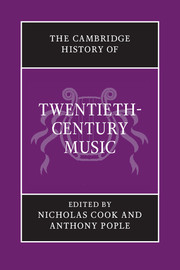Book contents
- Frontmatter
- Introduction: trajectories of twentieth-century music
- 1 Peripheries and interfaces: the Western impact on other music
- 2 Music of a century: museum culture and the politics of subsidy
- 3 Innovation and the avant-garde, 1900–20
- 4 Music, text and stage: the tradition of bourgeois tonality to the Second World War
- 5 Classic jazz to 1945
- 6 Flirting with the vernacular: America in Europe, 1900–45
- 7 Between the wars: traditions, modernisms, and the ‘little people from the suburbs’
- 8 Brave new worlds: experimentalism between the wars
- 9 Proclaiming the mainstream: Schoenberg, Berg, and Webern
- 10 Rewriting the past: classicisms of the inter-war period
- 11 Music of seriousness and commitment: the 1930s and beyond
- 12 Other mainstreams: light music and easy listening, 1920–70
- 13 New beginnings: the international avant-garde, 1945–62
- 14 Individualism and accessibility: the moderate mainstream, 1945–75
- 15 After swing: modern jazz and its impact
- 16 Music of the youth revolution: rock through the 1960s
- 17 Expanding horizons: the international avant-garde, 1962–75
- 18 To the millennium: music as twentieth-century commodity
- 19 Ageing of the new: the museum of musical modernism
- 20 (Post-)minimalisms 1970–2000: the search for a new mainstream
- 21 History and class consciousness: pop music towards 2000
- 22 ‘Art’ music in a cross-cultural context: the case of Africa
- Appendix 1 Personalia
- Appendix 2 Chronology
- Index
- References
18 - To the millennium: music as twentieth-century commodity
Published online by Cambridge University Press: 28 March 2008
- Frontmatter
- Introduction: trajectories of twentieth-century music
- 1 Peripheries and interfaces: the Western impact on other music
- 2 Music of a century: museum culture and the politics of subsidy
- 3 Innovation and the avant-garde, 1900–20
- 4 Music, text and stage: the tradition of bourgeois tonality to the Second World War
- 5 Classic jazz to 1945
- 6 Flirting with the vernacular: America in Europe, 1900–45
- 7 Between the wars: traditions, modernisms, and the ‘little people from the suburbs’
- 8 Brave new worlds: experimentalism between the wars
- 9 Proclaiming the mainstream: Schoenberg, Berg, and Webern
- 10 Rewriting the past: classicisms of the inter-war period
- 11 Music of seriousness and commitment: the 1930s and beyond
- 12 Other mainstreams: light music and easy listening, 1920–70
- 13 New beginnings: the international avant-garde, 1945–62
- 14 Individualism and accessibility: the moderate mainstream, 1945–75
- 15 After swing: modern jazz and its impact
- 16 Music of the youth revolution: rock through the 1960s
- 17 Expanding horizons: the international avant-garde, 1962–75
- 18 To the millennium: music as twentieth-century commodity
- 19 Ageing of the new: the museum of musical modernism
- 20 (Post-)minimalisms 1970–2000: the search for a new mainstream
- 21 History and class consciousness: pop music towards 2000
- 22 ‘Art’ music in a cross-cultural context: the case of Africa
- Appendix 1 Personalia
- Appendix 2 Chronology
- Index
- References
Summary
In response to the new challenges created by the internet and the converging of communications media, the industry is working very hard on systems of encryption and watermarking and collaborates with the government to set up a strong legal framework and to educate the public about the value of music.
Frances Lowe, Director, British Music Rights, The Performing Rights SocietyIt is sickening to know that our art is being traded like a commodity rather than the art that it is.
Lars Ulrich, drummer of heavy metal band MetallicaThere was this bloke and there was me and we really got along. Our friendship was founded on our mutual passions for pop music, indolence and substance abuse. We would sit around together, heroically stoned, and play records all day long: punk records, soul records, horny disco records like ‘Hot Stuff’ by Donna Summer …
Dave Hill, music journalistTwentieth-century listening and its spaces
Artists, fans, and the music business share an uneasy but symbiotic partnership. Dave Hill’s homosocial friendship, exploring music not through performance but through listening to purchased recordings, is a deeply twentieth-century subjectivity, reflecting the basic premise of much musical entertainment since the invention of sound recording. This involves a set of paradoxical relationships. For one thing, ‘music’ is a phenomenon that can and perhaps should be considered and enjoyed in and for itself – but to facilitate this enjoyment it has become a commodity, bought, sold, and consumed, to the regret of many composers and performers such as Lars Ulrich.
- Type
- Chapter
- Information
- The Cambridge History of Twentieth-Century Music , pp. 478 - 505Publisher: Cambridge University PressPrint publication year: 2004
References
- 1
- Cited by



